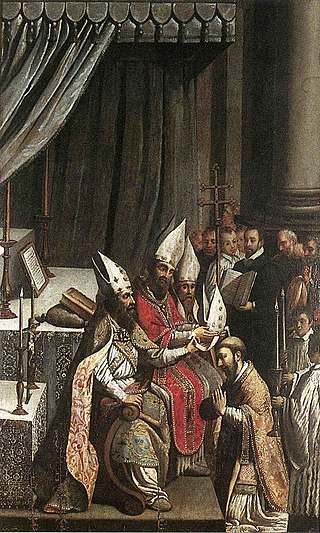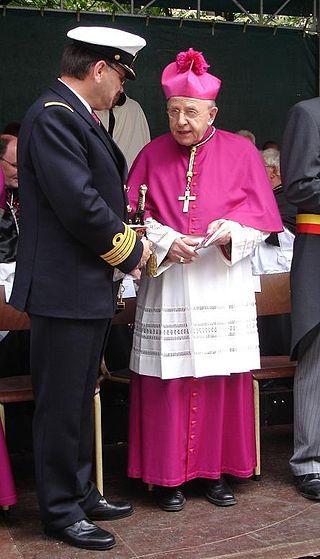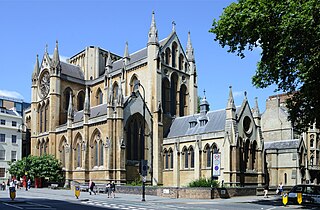External links
- www.united-apostolic.org United Apostolic Church Europe (UAC)
The member churches of the United Apostolic Church are independent communities in the tradition of the Catholic Apostolic revival movement.

Apostolic succession is the method whereby the ministry of the Christian Church is considered by some Christian denominations to be derived from the apostles by a continuous succession, which has usually been associated with a claim that the succession is through a series of bishops. Those of the Catholic, Eastern Orthodox, Scandinavian Lutheran, Anglican, Oriental Orthodox, Church of the East, Hussite, Moravian, and Old Catholic traditions maintain that "a bishop cannot have regular or valid orders unless he has been consecrated in this apostolic succession". These traditions do not always consider the episcopal consecrations of all of the other traditions as valid.

An episcopal polity is a hierarchical form of church governance in which the chief local authorities are called bishops. The word "bishop" here is derived via the British Latin and Vulgar Latin term *ebiscopus/*biscopus, from the Ancient Greek ἐπίσκοπος epískopos meaning "overseer". It is the structure used by many of the major Christian Churches and denominations, such as the Catholic, Eastern Orthodox, Oriental Orthodox, Church of the East, Anabaptist, Lutheran, and Anglican churches or denominations, and other churches founded independently from these lineages. Many Methodist denominations have a form of episcopal polity known as connexionalism.

An apostolic nuncio is an ecclesiastical diplomat, serving as an envoy or a permanent diplomatic representative of the Holy See to a state or to an international organization. A nuncio is appointed by and represents the Holy See, and is the head of the diplomatic mission, called an apostolic nunciature, which is the equivalent of an embassy. The Holy See is legally distinct from the Vatican City or the Catholic Church. In modern times, a nuncio is usually an archbishop.

A prelate is a high-ranking member of the Christian clergy who is an ordinary or who ranks in precedence with ordinaries. The word derives from the Latin praelatus, the past participle of praeferre, which means 'carry before', 'be set above or over' or 'prefer'; hence, a prelate is one set over others.

An episcopal see is, in a practical use of the phrase, the area of a bishop's ecclesiastical jurisdiction.

An exarch was the holder of any of various historical offices, some of them being political or military and others being ecclesiastical.

The Armenian Apostolic Church is the national church of Armenia. Part of Oriental Orthodoxy, it is one of the most ancient Christian institutions. The Kingdom of Armenia was the first state in history to adopt Christianity as its official religion under the rule of King Tiridates III, of the Arsacid dynasty in the early 4th century.

The Catholic Apostolic Church (CAC), also known as the Irvingian Church or Irvingite Church, is a denomination in the Restorationist branch of Christianity. It originated in Scotland around 1831 and later spread to Germany and the United States. The tradition to which the Catholic Apostolic Church belongs is sometimes referred to as Irvingism or the Irvingian movement after Edward Irving (1792–1834), a clergyman of the Church of Scotland credited with organising the movement.
An apostolic vicariate is a territorial jurisdiction of the Catholic Church under a titular bishop centered in missionary regions and countries where dioceses or parishes have not yet been established. The status of apostolic vicariate is often a promotion for a former apostolic prefecture, while either may have started out as a mission sui iuris. It is essentially provisional, though it may last for a century or more. The hope is that the region will generate sufficient numbers of Catholics for the Church to create a diocese one day.
Sui iuris, also spelled sui juris, is a Latin phrase that literally means "of one's own right". It is used in both the Catholic Church's canon law and secular law. The term church sui iuris is used in the Catholic Code of Canons of the Eastern Churches (CCEO) to denote the autonomous churches in Catholic communion. The Catholic Church consists of 24 churches, including the Latin Church and 23 Eastern Catholic churches.

The New Apostolic Church (NAC) is a Christian church of the Irvingian tradition. Its origins are in 1863, in the split from the Catholic Apostolic Church during a schism in Hamburg, Germany.
In the Catholic Church, an apostolic visitor is a papal representative with a transient mission to perform a canonical visitation of relatively short duration. The visitor is deputed to investigate a special circumstance in a diocese or country, and to submit a report to the Holy See at the conclusion of the investigation.

The Apostolic Church is an international Christian denomination and Pentecostal movement that emerged from the Welsh Revival of 1904–1905. Although the movement began in the United Kingdom, the largest national Apostolic Church became the Apostolic Church Nigeria. The term "Apostolic" refers to the role of apostles in the denomination's church government, as well as a desire to emulate 1st century Christianity in its faith, practices, and government.

The Catholic Church in the United Kingdom is organised into the Catholic churches in England and Wales, Scotland, and with Northern Ireland organised as part of the Catholic Church in Ireland. All as part of the worldwide Catholic Church in communion with the Pope. While there is no ecclesiastical jurisdiction corresponding to the United Kingdom as a whole, this article refers to the Catholic Church's geographical representation in Great Britain and Northern Ireland, ever since the establishment of the Kingdom of Great Britain by the Acts of Union 1707, and later the United Kingdom.
Apostolic Church may refer to:
RZUA (Reformed Zion Union Apostolic Churches of America) is a Methodist Christian denomination with a predominantly African-American membership that resides mostly in the South Hill and Tidewater area of Virginia. It was founded in 1869 in Boydton, Virginia as the Zion Union Apostolic Church, and was reorganized as the Reformed Zion Union Apostolic Church in 1882. In 2023 it had 35 congregations.